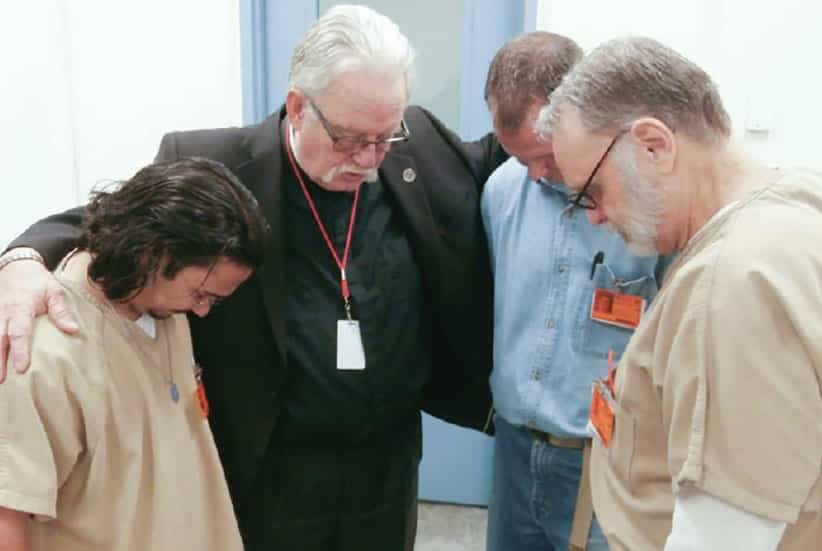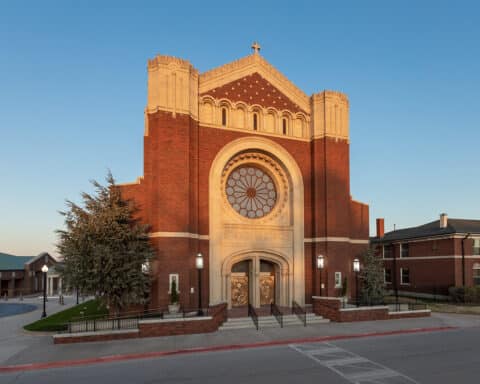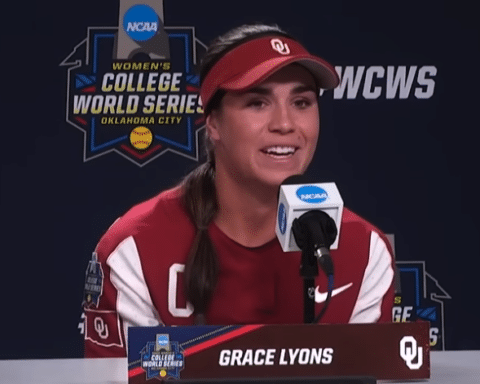“Even though I’m serving a prison sentence of 150 years, I’ve never felt freer,” said J.D. Langston, an inmate at Cimarron Correctional Facility in Cushing, Oklahoma.
His freedom is knowing God. No walls, rules or restraints can keep him from God.
Langston is part of a faith group at the prison that is bringing a new sense of calm, compassion and community into a seemingly God-forsaken place.
In the Diocese of Tulsa, volunteers, led by Deacon Kenny Longbrake, director of prison ministry, are helping prisoners experience God’s love and forgiveness. They are working at Cimarron and four other prisons in the diocese, through a faith program called Kairos.
The wardens are big fans of Kairos. They see the peacefulness it brings and how it changes the prison environment. In fact, one Kairos weekend, the prison was on lockdown. But the wardens let Kairos continue knowing its powerful impact. “No one else was moving,” Deacon Longbrake explained, “but God was moving.”
Working in prison ministry can be daunting, but Christians are called to practice the corporal works of mercy, which includes “visiting the imprisoned,” to bring the light of Christ to these darkest of places.
Langston’s story
Langston does not mind sharing his story because he believes the worse parts are behind him. After a rough childhood that included sexual abuse, he became addicted to drugs, was a runaway at age 15 and landed in prison for assault at age 19. After two years he was released, but he returned a month later for assault again. Having been convicted on four counts of shooting with intent to kill, he is now there for good.
In prison, he said, “I claimed to be a Satanist.” As most inmates do, he joined a gang and was promised protection in the hazardous environment. Daily living was treacherous, and Langston was working hard to fend for himself when he noticed a guy who was not part of a gang and who seemed to smile all the time. Langston found out he was a Christian.
In 2003, Langston attended a Kairos retreat. It changed his life. The first thing that struck him during the retreat was that he cried. He had only allowed himself to cry twice during his time in prison, when each of his parents died.
“I was hurting all the time,” he said, “but I would never cry, even if no one was watching.” Crying indicated vulnerability. “At Kairos, it was a downpour. I had to stop my testimony five times.” It was his breakthrough.
He has since reconciled himself to his life as an inmate. He works with the prison’s administration, giving orientations to new inmates and telling them about Kairos and the pitfalls of gangs. He does public speaking about his conversion and reads Scripture daily. He is now that smiling Christian who is a mystery to troubled inmates.
“He’s one of the best evangelizers we have at Cimarron,” Deacon Longbrake said.
Kairos conversions
Kairos Prison Ministry International is a nondenominational Christian program. The initial retreats are held twice a year from Thursday evening to Sunday afternoon. Each retreat hosts 42 inmates. Ideally, there are 42 volunteers — one for each inmate. The retreat staff brings in all the supplies: tables, totes with food, coffee makers, speaker and music systems, Bibles and overhead projectors.
In 2016, Catholic Extension — the fundraising group that works to support mission dioceses — gave a Year of Mercy grant to the diocese to purchase Kairos supplies and a trailer to store and transport them. With so many retreats running, the trailer has made a world of difference. Logistics are easier to plan and retreats run more smoothly.
Inmates are divided into seven groups of six that become a unit — a brotherhood. Each group is given a name from the Gospel, such as “Family of Luke.”
The retreats offer talks and discussions. It is a time of healing, sharing stories and camaraderie. Barriers begin to fall. Inmates start connecting. Suddenly, they are finding a group that is not based on fear and confrontation, like the gangs in prison, but on faith and love.
Inmates who have attended previous Kairos retreats return as servants for the next participants. “These guys have never been treated so kindly, especially in prison, where kindness is considered a weakness,” Deacon Longbrake said. “People don’t take care of each other here, so the stark contrast of Kairos is huge.”
For many, it blows their minds. They are not used to this level of companionship and affection. Many have never known fatherly love and can’t understand the concept of God as a loving Father. “Inmates often come to the retreat sheltering great hatred. By the end, they are giving hugs,” Deacon Longbrake said.
“At the closing ceremony, you see grown men, tattooed from head to foot, bawling their eyes out in front of 100 people because they have come to know God,” he said.
Community members are invited to the closing ceremony as a surprise to the participants. Just before the men express their thoughts about the weekend, a curtain is pulled back to reveal a crowd of outsiders who have gathered to listen to their testimonies and reinforce each man in his new journey. At the end, all the inmates and guests form a circle around the room, hand in hand, to pray. It is a powerful experience.
The love continues after the retreat. Every Tuesday night, Deacon Longbrake and others return to lead small groups in prayer and sharing. One Sunday a month, they hold a bigger reunion.
“We build nests of Kairos people, so they can protect each other,” Deacon Longbrake said. “When they declare themselves as Christians, they put a target on their back. They’ve been bold enough to take a stand, and we want to keep them strong.”
“The rate of recidivism among inmates who attend Kairos is way lower than the normal rate,” he continued. “For the regular inmate population, the return rate is more than 50 percent, and for Kairos participants it is below 20 percent, especially for those who do a retreat near their release date.”
Embracing the incarcerated
In 1997, when the Cimarron Correctional Facility was being proposed near his home, Deacon Longbrake (who was not yet a deacon) opposed it. He did not want a “bunch of thugs” in his backyard.
He had married at age 17 and had a wonderful wife and three sons, but he was not an attentive husband and father. He had left the Church, and he was struggling. He came upon Henri Nouwen’s book “The Return of the Prodigal Son” (Image Books, $16), and it struck a nerve. He knew he was the stray son and needed to come home.
Deacon Longbrake returned to the Church and began diaconate studies. In 2004 he was asked to join a Kairos retreat. Deacon Longbrake wasn’t interested and was unsympathetic toward prisoners, but he went anyway. Ordained in 2007, he took over prison ministry in the diocese.
“When I attended my first Kairos, I knew it was fertile ground. Hearts can be changed so quickly, and inmates want Christ in their lives so badly.”
Prison ministry began in the Diocese of Tulsa, Oklahoma, in the 1990s with one priest saying prayer vigils at every execution. Today, that effort has evolved into five priests and four deacons. They celebrate the sacraments and provide a regular Catholic presence.
In addition to his work in prisons, Deacon Longbrake serves at two rural parishes. He is active in marriage support, hospital ministry and visiting the elderly and homebound.
For these contributions, the Diocese of Tulsa nominated him in 2016 for Catholic Extension’s annual Lumen Christi Award, which recognizes those who bring the “light of Christ” to others.
His favorite ministry, by far, is working with the incarcerated. In addition to Kairos, he does RCIA in prison. “For many inmates, their families have given up on them. Society has given up on them,” he said, “but God hasn’t given up on them. We need to let them know that.”
Liz Boo is editor of Extension magazine.





